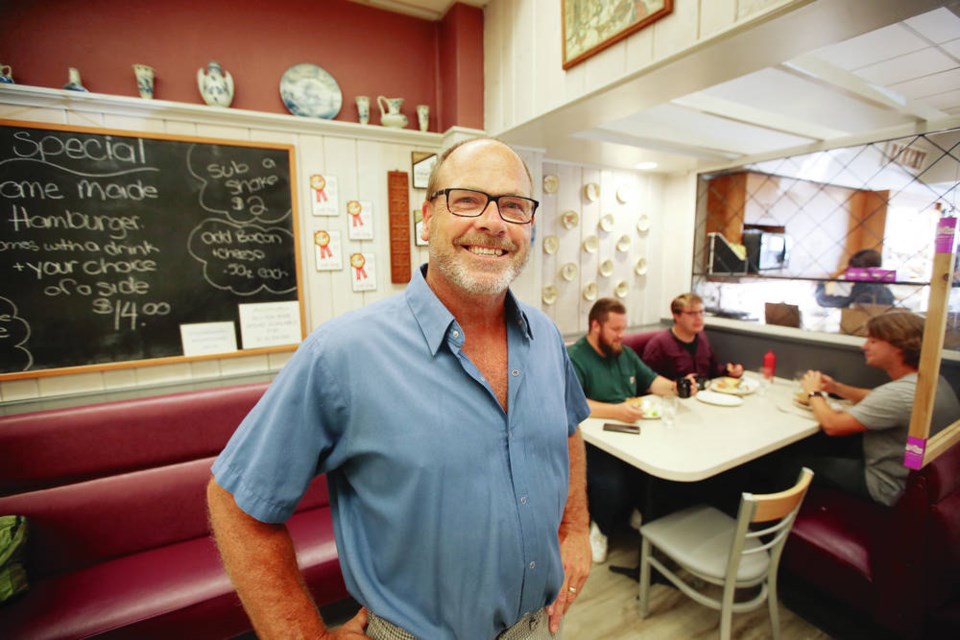As summer winds down, downtown businesses are becoming increasingly apprehensive about what will happen if office workers continue to work from home.
“The fall kind of has big question marks attached to it,” said Lee Tanner, general manager of Frankie’s Modern Diner on Government Street, which has seen a drop in business of 20 to 40 per cent a day during the summer.
It’s understandable that workers have not returned, Tanner said, but it has resulted in a “noticeable lack of energy” downtown at midday and in the afternoon.
Government employees are key to the downtown economy. The Finance Ministry says the province has about 13,000 employees in the capital region, many of whom are based in downtown buildings.
Along with other downtown restaurants, Tanner is thankful for being permitted to install outdoor patios this year. Frankie’s has 50 outdoor seats, which make a “huge difference,” he said, adding he’s grateful for the B.C. and Alberta tourists who turned up in the summer.
Normally in the fall, business declines by about 40 per cent, but Tanner is bracing for the possibility that it will drop by 60 per cent or more this fall. The restaurant will remain open and indoor partitions are being installed, he said.
Solomon Siegel, part-owner and general manager of Pagliacci’s on Broad Street, said he would love to be able to keep outdoor seating year-round. He said he’s willing to invest in outdoor structures to protect customers if he can get assurances that they will be allowed to stay.
“Really what we need is some permanent solution for some outdoor seating.”
The restaurant had a successful August, he said, praising the city for closing Broad Street to traffic and permitting live music, and neighbouring businesses for agreeing to share street space.
Jack Schaddelee, part owner of the Dutch Bakery on Fort Street, described the past months as “tough.”
“Downtown has not been busy like it usually is. But we’ve been here many years, so we’ve got a lot of loyal customers.”
He’s hoping as time passes, office workers will return and support small businesses.
Businesses specializing in office design have been called on to reconfigure workspaces with more enclosed offices and partitions, so employees can return to work.
Jeff Bray, executive director of the Downtown Victoria Business Association, said he expects that during the long weekend, many retailers and restaurants will be reviewing July and August performance to determine if they can get through the fall and into the holiday shopping season in December.
“We are very, very concerned that office workers, particularly the public sector, are not returning to their offices,” he said. “I can’t underscore this enough that I think it will be catastrophic in urban commercial areas.”
Downtown retailers and restaurants could see significant closures over the next month, said Bray, adding downtown businesses are hit extra hard because they pay higher rents than elsewhere, meaning they have to sell more meals and more merchandise.
A campaign to encourage shopping local called SavetheSales Victoria — where shoppers log how much they’ve spent at local businesses — has surpassed $255,000 in sales, Bray said. More events are planned to help drive traffic.
Businesses with a strong local following are still doing OK, he said, but “without those office workers, there simply is not the revenue within downtown to keep many of those business going.” A lot of businesses rely on the lunch trade, which is largely supported by office workers, he said.
The association is calling on municipal and provincial governments to permit outdoor patio seats and relaxed liquor rules to continue beyond the end of October. They need to stay in place through the fall “to give businesses every opportunity to maximize capacity and revenues,” said Bray, who had no figures on how many workers are coming into downtown offices, but estimated it’s likely about 25 to 30 per cent of normal.
The provincial government, which has taken a strong leadership role in dealing with the COVID pandemic, also needs to show leadership in supporting the local economy by developing and implementing back-to-office plans for government employees, Bray said.
